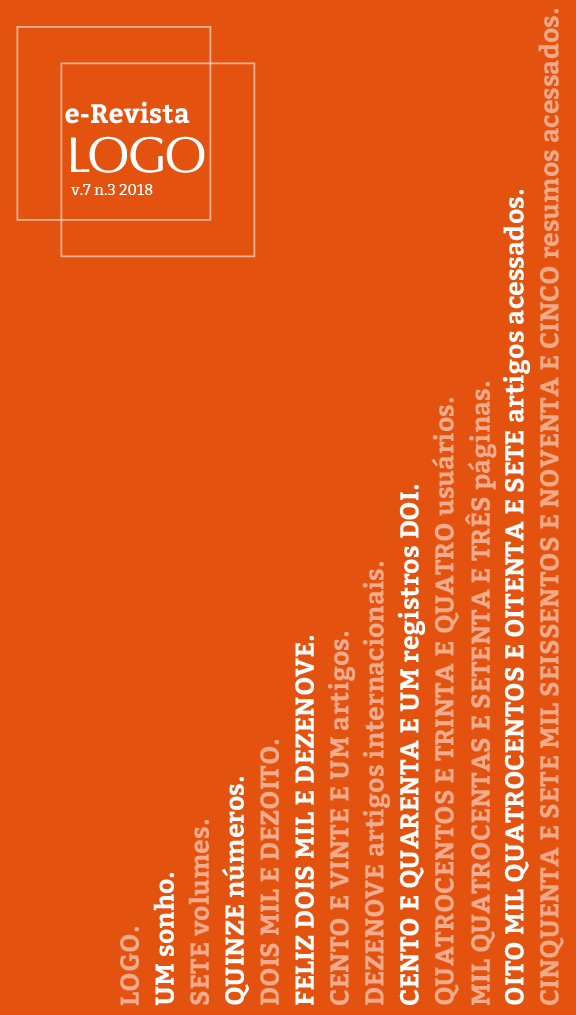Trends management applied to branding and cultural management
Palavras-chave:
Trends Studies, Coolhunting, Branding, Cultural Management.Resumo
Trends studies are giving their irst steps in academia, after having
proven themselves in the social and corporate ields. Now it is important
to develop scientiic models for the application of trends studies, including
their major tool and discipline: coolhunting. The creation of models
in this disciplinary ield allows the creation of standards in the identiication
and continuous observation of trends, as well as their application in
the generation of innovation and in decision-making insights, regarding
major mindsets and consumer behavior patterns. The goal of this paper
is to analyze the existing tools and perspectives on coolhunting and
trends studies. Therefore, the creation of a complex matrix is proposed,
based on the Portuguese perspective and developments in this ield,
with several combined models that promote the study and the application
of trends on branding, without overlooking cultural management.
Referências
GLOOR, Peter; COOPER, Scott. Coolhunting: Chasing down the next
big thing. New York: Amacom, 2009.
GOMES, Nelson P. “Comportamento de Consumo, Elites Sociais e
Moda. Contributo para a consolidação disciplinar dos estudos de
tendênciasâ€. PhD Thesis in Culture and Communication, University of
Lisbon, Lisbon 2015.
GOMES, Nelson P.; FRANCISCO, Ana. Introdução aos Estudos de Tendências:
Conceitos e Modelos. Lisbon: Trends Research Center, 2013.
HIGHAM, William. The Next Big Thing. London: Kogan Page, 2009.
MCCRACKEN, Grant. Chief Culture Oicer. How to create a living,
breathing corporation. New York: Basic Book, 2011 [2009].
RAYMOND, Martin. The Trend Forecaster´s Handbook. London:
Laurence King, 2010.
VEJLGAARD, Henrik. Anatomy of a Trend. New York: McGraw-Hill,
SCIENCE OF THE TIME - http://www.scienceofthetime.com. Access in
-02-2016.
Downloads
Publicado
Edição
Seção
Licença
This journal, following the recommendations of the Open Access movement, provides public access to all its content, following the principle that free access to research generates a greater global exchange of knowledge. Such access is associated with the reading and citing an author's work.
The author must ensure:
-
that there is a full consensus of all co-authors in approving the final version of the document and its submission for publication.
-
that their work is original, and if the work and / or words of other people were used, they were duly recognized.
Plagiarism in all its forms constitute unethical publication behavior and is unacceptable.
The articles and other published works, become the property of the journal.
The contents of e-Journal LOGO are licensed under a Creative Commons License 4.0 by. It reserves the right to use software or other methods of detecting plagiarism to analyze the submitted works.
Under the license you have the right to:
- Share - copy and redistribute the material in any media or format
- Adapt - remix, transform, and create from material to any purpose, even if commercial.
- The licensor can not revoke these rights as long as you respect the license terms.
According to the following terms:
- Assignment - You must give the appropriate credit, provide a link to the license and indicate if changes have been made. You must do so in any reasonable circumstance, but in no way do you suggest to the licensor to support you or your use.
- No additional restrictions - You may not apply legal terms or technological measures that legally restrict others from doing anything that the license permits.
The authors of papers submitted to the e-Journal LOGO authorize their publication in physical and electronic media for academic purposes. The authors also agree on the distribution of articles by national and international indexing databases, whether or not for profit, and can be reproduced as long as the source is cited.
O autor deve garantir:
- que haja um consenso completo de todos os coautores em aprovar a versão final do documento e sua submissão para publicação.
- que seu trabalho é original, e se o trabalho e/ou palavras de outras pessoas foram utilizados, estas foram devidamente reconhecidos.
Plágio em todas as suas formas constituem um comportamento antiético de publicação e é inaceitável.
Os artigos e demais trabalhos publicados, passam a ser propriedade da revista.
Os conteúdos de e-Revista LOGO estão licenciados sob uma Licença Creative Commons 4.0 by. Reserva-se o direito de usar software ou otros métodos de detecção de plágio para analisar os trabalhos submetidos.
Segundo a licença você tem direito de:
- Compartilhar — copiar e redistribuir o material em qualquer suporte ou formato
- Adaptar — remixar, transformar, e criar a partir do material para qualquer fim, mesmo que comercial.
- O licenciante não pode revogar estes direitos desde que você respeite os termos da licença.
De acordo com os termos seguintes:
- Atribuição — Você deve dar o crédito apropriado, prover um link para a licença e indicar se mudanças foram feitas. Você deve fazê-lo em qualquer circunstância razoável, mas de maneira alguma que sugira ao licenciante a apoiar você ou o seu uso.
- Sem restrições adicionais — Você não pode aplicar termos jurídicos ou medidas de caráter tecnológico que restrinjam legalmente outros de fazerem algo que a licença permita.


